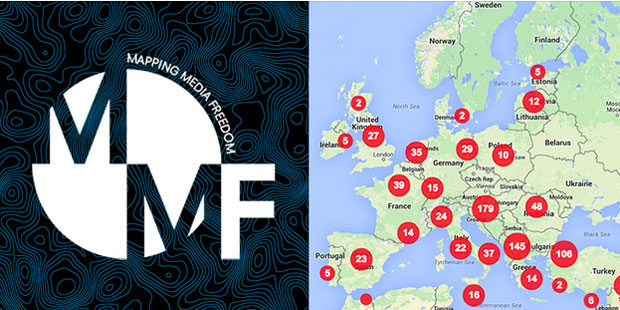Click on the dots for more information on the incidents.
Each week, Index on Censorship’s Mapping Media Freedom project verifies threats, violations and limitations faced by the media throughout the European Union and neighbouring countries. Here are five recent reports that give us cause for concern.
Turkey: Access to Social Media Sites Blocked After Deadly Blast At Istanbul Airport
June 28: Shortly after an attack that saw three suicide bombers target Istanbul airport, killing 41 people and injuring more than 200, the government imposed a gag order to Turkish media outlets. This was followed by social media users reporteing problems with access and switching to VPN services.
Gag orders are frequently used by the Turkish authorities. But this time, shortly after the attack, RTUK, Turkey’s Radio and Television Supreme Council, expanded the ban to include all media.
According to Vocativ, the office of the Turkish Prime Minister instituted the ban on any photos or videos of the explosion for national security reasons.
According to Mashable, the media ban has been an issue as Turkey has been the victim of a spate of terror attacks in the last year, including a suicide bombing in Suruc in July 2015, a double suicide bombing in Ankara in October 2015, a suicide bombing in Istanbul in January and a deadly bombing in Ankara in February.
UK: Guardian journalists denied entry into Donald Trump event
25 June: A Guardian reporter was denied access to a golf course resort in Aberdeen owned by Donald Trump, where US presidential candidate was on the second day of a two-day UK visit.
Two Guardian journalists were denied entry to the golf club by staff who said they weren’t on the list and did not have credentials.
At a press conference on Friday at his Turnberry golf course in Ayrshire, Trump took offence when a Guardian journalist asked him why UK and Scottish senior politicians had not come to meet him, suggesting it might be because he was toxic.
He replied by saying the questioner was a “nasty guy”.
Trump has banned several newspapers and media organisations from campaign events, including Buzzfeed in 2015 and The Washington Post in June 2016.
Spain: Police attempt to seize recording of conversation between interior minister and anti-fraud chief
24 June: Two days before the general elections, two police officers entered the newsroom of website Público in Madrid asking for the recording of a conversation between the Spanish interior minister and a regional anti-fraud office chief, the newspaper reported.
Público executives refused to hand over the material because the agents didn’t have a court order, according to Público.
On Tuesday 21 June, left-leaning Público website published the secret conversation between centre-right interior minister Jorge Fernández Díaz and Daniel de Alfonso, director of Catalan anti-corruption office.
The conversation took place in October 2014, when the officials discussed the investigation directed at members of the two regional political parties which had been organizing a referendum on independence. They were planning to fabricate scandals related to separatists, informed Público, calling it a “conspiracy”.
In November 2012, the local centre-right Democratic Convergence of Catalonia party and left-wing party Republican Left of Catalonia organised a non-official referendum in Catalonia, north-eastern region, where a majority of citizens voted in favour of independence from Spain.
The Spanish Constitutional Court prohibited the referendum, claiming it was not legal according to the constitution.
Center-right Partido Popular has been in power since 2011 and both interior minister Fernández Díaz and prime minister Mariano Rajoy said the case, [in the run-up to the general elections], is a “campaign maneuver” produced by their political rivals.
Turkey: Cumhuriyet newspaper receives death threats from businessman
24 June: Turkish businessman Mehmet Cengiz threatened newspaper Cumhuriyet with death threats over the phone, Turkish Minute reported.
Cengiz whose name was mentioned during the corruption scandal in December of 2013, called the newspaper headquarters telling them “I will fight you. Don’t make this man a killer”, reported Ozgur Dusunce news website.
The threat came shortly after Cumhuriyet newspaper announced it was set to publish a series of documents leaked through the Panama Papers, which would include Mehmet Cengiz, and other well-known businessmen with ties to the ruling government of Justice and Development Party.
Serbia: Local politician menaces cameraperson
24 June: A local politician for the Democratic Party of Sandzak, Behri Beganovi, menaced and tried to stop Alem Rovcanin, a cameraperson for TV Novi Pazar, from filming during a session of the local parliament in Prijepolje, news agency Tanjug reported.
According to Rovcanin, Beganovic cursed at him multiple times, and then reached for his camera, telling him he should not film him.
Due to the interference of other parliament members, the camera remained untouched.
Beganovic, the founder of the party DPS, was reportedly unhappy that cameraperson Alem Rovcanin was filming him during a parliamentary session.
Regional TV Novi Pazar has condemned the incident and asked journalist associations to react.
Mapping Media Freedom
|





